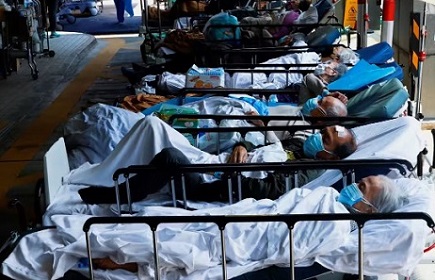Thailand Medical Authorities Announce COVID-19 Surge With 1,004 New Hospitalizations In Last 7 Days, 292 In ICU And 101 Needing Intubation!
Thailand Medical: The recent Songkran celebrations in Thailand have been followed by a concerning surge in COVID-19 cases, prompting medical authorities to announce a significant uptick in hospitalizations. Over the last seven days (14th April to 20th April 20204), the country has seen a staggering increase, with 1,004 new COVID-19 hospitalizations, 292 patients in intensive care units (ICUs), and 101 individuals requiring intubation due to severe symptoms. There were also three COVID-19 deaths recorded for the same period.
 Thailand Medical Authorities Announce COVID-19 Surge With 1,004
Thailand Medical Authorities Announce COVID-19 Surge With 1,004
New Hospitalizations In Last 7 Days, 292 In ICU And 101 Needing
Intubation. (Pic-Stock Shots)
Thailand Medical News had warned in our last COVID-19 update that COVID-19 cases are likely to rise in the Post-Songkran period.
https://www.thailandmedical.news/news/thailand-medical-experts-warn-covid-19-cases-are-silently-rising-at-worrisome-rates-849-covid-19-hospitalizations-and-4-deaths-in-last-7-days
Post-Songkran COVID-19 Surge: Expected Impact
The Department of Disease Control (DDC) in Thailand highlighted that the surge in COVID-19 cases post-Songkran was anticipated. The festivities, marked by numerous gatherings and parties, contributed to the rise in infections, particularly due to the prevalent JN.1 strain of the virus. Dr Thongchai Keeratihattayakorn, Director-General of the DDC, emphasized that the JN.1 subvariant of the Omicron variant remains dominant in the country.
https://ddc.moph.go.th/brc/news.php?news=42475&deptcode=brc&news_views=845
The figures disclosed by the officials cannot be validated to be true or not and many suspect the actual figures could be far much higher. Already private hospital across the country are facing a deluge of COVID-19 infected patients both outpatients and also admissions and various clinics across the country are witnessing a rise of individuals sick with respiratory issues.
Thai authorities also do not disclose number of COVID-19 test conducted per day and also positivity rates, thus concealing the actual degree of spread in the local population.
Amazingly, many Thais and local expats are no longer wearing protective mask at shopping malls and many public places.
Characteristics of the JN.1 Strain
Despite the surge in cases, government medical experts claim that they have noted that the JN.1 strain does not exhibit significantly d
ifferent characteristics compared to previous Omicron variants. Dr Thongchai reassured the public that there are no indications suggesting increased severity in symptoms associated with the JN.1 strain. (He did not explain then as to why there were 1,004 new COVID-19 hospitalizations with 292 in ICU and 111 needing intubation!)
He claimed that patients infected with this variant typically experience flu-like symptoms such as fever, cough, sore throat, body aches, headaches, and a runny nose.
Management of COVID-19 Hospitalizations
The rise in hospitalizations, especially among high-risk groups such as the elderly, individuals with chronic diseases, and pregnant women, has prompted a focused response from healthcare authorities. The DDC underscored the importance of early detection and isolation to prevent further transmission of the virus. Despite the increase in cases, there has been no reported severe outbreak, but vigilance remains crucial.
Healthcare Preparedness and Response
Authorities have directed all provinces to assess the current COVID-19 situation and enhance preparedness measures. Hospitals across the country are well-equipped with medical personnel, beds, and supplies to manage the influx of COVID-19 patients effectively. With experience gained from previous waves of the pandemic, healthcare facilities are well-prepared to provide comprehensive care to those in need.
Public Health Measures and Recommendations
In light of the ongoing surge, the DDC has reiterated the importance of personal hygiene practices and adherence to preventive measures. This includes wearing masks in crowded settings, frequent handwashing, and self-isolation if experiencing flu-like symptoms. Additionally, individuals are encouraged to conduct at-home antigen tests (ATK) if symptomatic and seek medical attention promptly if results indicate a positive infection.
Response for High-Risk Groups
Specific guidelines have been outlined for high-risk groups, particularly individuals with chronic illnesses or elderly individuals. If presenting with flu-like symptoms and a positive ATK result, immediate medical consultation and treatment are advised to minimize the risk of developing severe symptoms or complications.
Conclusion: Managing the Ongoing Surge
As Thailand grapples with the surge in COVID-19 cases post-Songkran, a concerted effort between healthcare authorities, communities, and individuals is imperative to mitigate further spread. By adhering to established public health protocols, enhancing testing and treatment capabilities, and prioritizing the well-being of high-risk populations, the country aims to navigate through this challenging period and emerge resilient in the ongoing battle against the pandemic.
For the latest on the COVID-19 situation in Thailand, keep on logging to
Thailand Medical News.
